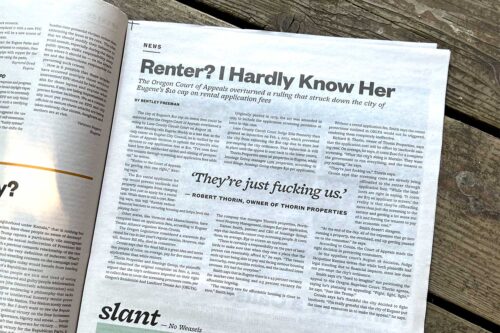
The city of Eugene’s $10 cap on rental fees could be enforced after the Oregon Court of Appeals overturned a ruling by Lane County Circuit Court on August 28.
Matt Keating tells Eugene Weekly in a text that as the only renter on Eugene City Council, he is thrilled by the Court of Appeals decision to uphold the council’s 2022 decision to cap application fees at $10. “I’ve seen firsthand how the unchecked nickel-and-diming of prospective tenants through screening and application fees adds up,” he writes.
“Kudos to the Court of Appeals for getting this one right,” Keating says.
The $10 rental application fee cap would prevent landlords and property managers from charging large fees just to apply for a rental unit. While there is still a cost, Keating says, this will “further reduce financial barriers to securing housing and helps level the playing field.”
Other states, like Vermont and Massachusetts, have complete bans on application fees, according to Eugene Tenant Alliance organizer Kevin Cronin.
The Oregon Legislature considered a statewide $10 rental fee cap in last year’s regular session. However, that bill, Senate Bill 684, died in committee.
Cronin says that the dead bill is a great idea and notes that people of color, on average, pay for five more rental applications than white renters.
Thorin Properties and Jennings Group, the plaintiffs who submitted the original complaint on Nov. 2, 2022, argued that the city’s ordinance impeded on their right to collect fees to cover the screening processes costs, per Oregon’s Residential And Landlord Tenant Act (ORLTA).
Originally passed in 1973, the act was amended in 1993 to include the application screening provision at issue in this case.
Lane County Circuit Court Judge Erin Fennerty then granted an injunction on Feb. 1, 2023, which prevented the city from enforcing the $10 cap due to state law pre-empting the city ordinance. That injunction is still in place until the appeal is sent back to the lower courts.
Thorin Properties owns 96 properties in Eugene, while Jennings Group manages 1,595 properties, according to court filings. Jennings Group charges $50 per application. The company that manages Thorin’s properties, Northwood Property Management, charges $40 per application.
Darren Stone, partner and CEO of Jennings Group, says that landlords cannot stop screening people. It costs them, on average, $59 to screen an applicant.
“There is certainly a responsibility on the part of landlords to make sure that when they rent a place that the person can reasonably afford it,” he says. “The tenant ends up not being able to pay and facing serious housing insecurity, even possible eviction, and the landlord loses revenue. It’s bad for everyone.”
Stone says that in Eugene there is a 4.5 percent vacancy for market-rate housing and 0.5 percent vacancy for affordable housing.
“The vacancy rate for affordable housing is close to zero,” Stone says.
Without a rental application fee, Stone says the renter protections outlined in ORLTA would not be triggered, rendering them completely ineffective.
Richard B. Thorin, owner of Thorin Properties, says that the application cost will be offset by landlords raising rent. On average, he says, it costs $120 for a complete screening. “What the city’s doing is Marxist. They want the government to run everything, and the tenants to pay nothing,” he says.
“They’re just fucking us,” Thorin says.
Cronin says that screening costs are already being offloaded to the renter through application fees. “While the landlords are right in saying, ‘It costs me $75 an applicant to screen,’ the reality is that they’re offloading more than just the screening to the service and getting a lot more out of it and forcing the tenants to pay that economic cost.”
Stone doesn’t disagree.
“At the end of the day, all of the expenses that go into running a property, the overhead, end up getting passed on to the consumer,” he says.
According to Cronin, the Court of Appeals made the right decision in protecting consumers.
In the appellate court’s August 28 decision, Judge Jacqueline Kamins writes that while both plaintiffs had legal standing due to financial impacts, state law does not pre-empt the city’s ordinance.
Stone says it’s “hard to imagine” not petitioning the appeal to the Oregon Supreme Court. Thorin agrees, saying he’s planning on appealing. “Fight, fight, fight,” he says. “Just like Trump.”
Cronin says he’s thankful the city decided to fight landlords. “I’m really grateful that the city of Eugene put the time and resources in to make the appeal,” he says.